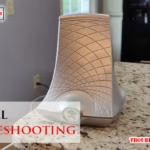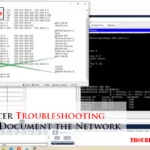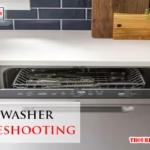Is your Bosch refrigerator acting up? Are you hearing strange noises, or maybe it’s not cooling as it should?
You’re not alone. Many Bosch refrigerator owners face these common issues, and the good news is, most of them can be solved without a costly repair call. In this guide, you’ll discover simple troubleshooting steps that can save you time and frustration.
Imagine the satisfaction of fixing the problem yourself, with your fridge running smoothly once more. So, if you want to keep your kitchen heart beating with a perfectly functioning refrigerator, read on. We’re here to guide you through every step, ensuring you get back to enjoying fresh food and a worry-free home.
Common Issues
Dealing with Bosch refrigerator issues can be frustrating. Yet, understanding common problems helps. This section discusses typical challenges and offers solutions. Let’s explore these issues to keep your fridge running smoothly.
Temperature Fluctuations
Temperature changes in your Bosch fridge can spoil food. Check the thermostat settings first. Ensure the vents inside the fridge aren’t blocked. Clean the condenser coils. Dust can cause temperature issues. Regular maintenance prevents many problems.
Unusual Noises
Strange sounds coming from your Bosch refrigerator? It might be the compressor. Or the fan motor. Listen closely to identify the source. Clean the fan blades if needed. Tighten any loose parts. Properly leveled fridges reduce noise. Keep it steady.
Ice Maker Problems
Ice maker not working? Inspect the water supply line. Ensure it’s not kinked or blocked. Check the ice maker settings. Reset if necessary. Clean the ice bin regularly. Sometimes debris causes malfunctions. Routine checks keep ice makers effective.
Water Leakage
Water leaks can damage your kitchen floor. First, check the drain pan. It might be full. Inspect the water filter, too. Ensure it’s properly installed. Examine door seals for tears. Worn seals cause leaks. Regular inspections help prevent water issues.

Credit: www.ifixit.com
Diagnostic Steps
Experiencing issues with your Bosch refrigerator? Follow these diagnostic steps to identify the problem. A systematic approach helps in finding the right solution. Let’s explore some basic checks you can perform.
Checking Power Supply
First, ensure the refrigerator is plugged in. Check the power outlet. Is it functioning? Test it with another appliance. If the outlet works, check the power cord for damage. A frayed or broken cord may disrupt power supply. Consider using a multimeter for accurate results.
Assessing Thermostat Function
A faulty thermostat can cause cooling issues. Set the thermostat to a colder setting. Wait a few hours. Did the temperature change? If not, the thermostat might be defective. Replace it if necessary.
Examining Door Seals
Door seals keep the cold air in. Check for gaps or cracks. Close the door on a piece of paper. Can you pull it out easily? If yes, the seal might be worn out. Replace damaged seals to improve efficiency.
Inspecting Condenser Coils
Dirty condenser coils can hinder cooling. Locate the coils at the back or bottom. Are they covered in dust? Clean them gently with a brush or vacuum. This helps in maintaining optimal cooling performance.
Maintenance Practices
Keeping your Bosch refrigerator in top condition ensures reliable performance. Regular maintenance extends its lifespan and prevents costly repairs. Simple habits can maintain efficiency and functionality.
Below are key maintenance practices to consider for your Bosch refrigerator.
Regular Cleaning
Dust and grime can affect your refrigerator’s efficiency. Clean the coils behind or beneath your fridge twice a year. Use a vacuum cleaner or brush to remove dirt and debris. Wipe the interior regularly with a mild detergent solution. Clean spills immediately to prevent staining and odor buildup. Use a soft cloth to avoid scratching surfaces.
Defrosting Techniques
Ice accumulation can hinder cooling efficiency. To defrost, unplug the refrigerator and remove all items. Keep the door open to let the ice melt naturally. Place towels around to absorb water. Avoid using sharp objects to scrape ice. Once defrosted, clean the interior before plugging back in. Regular defrosting keeps your appliance running smoothly.
Proper Loading Methods
Overloading can block air vents and affect cooling. Arrange items to allow air circulation inside. Avoid stacking items tightly. Store heavy items on lower shelves for stability. Keep frequently used items within easy reach. Ensure door seals are unobstructed to maintain proper closure. Proper loading helps maintain consistent temperature and energy efficiency.

Credit: www.youtube.com
Professional Assistance
Expert help is essential for Bosch refrigerator troubleshooting. Quick solutions prevent further issues and ensure optimal performance. Reliable professionals offer efficient repair services.
Navigating issues with your Bosch refrigerator can be a frustrating experience. While some problems can be resolved with a little DIY spirit, others might require the touch of a professional. Knowing when to seek professional help is crucial for maintaining the longevity of your appliance. Let’s discuss when to call in the experts and how to choose the right service for the job.When To Call A Technician
It’s tempting to fix every hiccup yourself. But sometimes, calling a technician is the best course of action. If your refrigerator starts making unusual noises that you can’t identify, it’s time to reach for the phone. This could be a sign of a malfunctioning compressor, which is not something you want to tamper with. Another red flag is if your refrigerator isn’t cooling properly. Perishable foods going bad too quickly? That’s a clear signal that you need professional assistance. A qualified technician can diagnose issues like coolant leaks or faulty thermostats, ensuring your fridge returns to optimal performance.Choosing The Right Service
Finding the right service can feel overwhelming, especially with so many options available. Start by checking the credentials of the technicians. Are they certified by Bosch? A certified technician will have the necessary training and experience to handle your specific model. Don’t hesitate to ask for reviews or recommendations from friends and family. Personal experiences can offer valuable insights into the reliability and efficiency of a service. You want someone who respects your time and your appliance. Consider the costs, but don’t let price be your only deciding factor. Sometimes paying a bit more for quality service can save you money in the long run. Have you ever wondered if a cheaper service could actually end up costing you more? A quick fix today could lead to a bigger problem tomorrow. Always balance cost with quality to ensure your Bosch refrigerator gets the care it deserves.Diy Fixes
DIY fixes for Bosch refrigerators can save time and money. Simple tasks can be tackled with basic tools. Understanding these tasks can improve your refrigerator’s efficiency. Let’s explore some common DIY fixes.
Replacing Filters
Regularly replace filters for clean air and water. Check the filter model in your Bosch refrigerator manual. Purchase the correct replacement filter online or at a store. Locate the filter compartment inside the fridge. Twist the old filter counterclockwise to remove it. Insert the new filter and twist it clockwise. Ensure it is tight and secure.
Adjusting Shelves
Adjust shelves to fit large items. First, empty the shelf you want to adjust. Hold the shelf firmly and lift it slightly. Slide it out gently from the brackets. Choose a new position for the shelf. Align it with the brackets and slide it back in. Ensure it is level and secure.
Fixing Ice Dispenser
If the ice dispenser jams, clear any blockages. First, unplug the refrigerator for safety. Check the ice chute for stuck ice pieces. Remove any blockages with a plastic utensil. Ensure the ice bin is not overfilled. Plug the refrigerator back in and test the dispenser. If issues persist, consult a professional.

Credit: www.davesmithappliance.com
Prevention Tips
Keep your Bosch refrigerator running smoothly by cleaning the coils regularly. Check door seals for leaks to save energy. Adjust the thermostat to the right temperature for optimal performance.
When it comes to keeping your Bosch refrigerator in top shape, prevention is key. Simple steps taken today can save you from costly repairs tomorrow. By following a few practical tips, you can ensure your fridge runs smoothly and efficiently.Avoiding Overloading
Overloading your refrigerator can lead to uneven cooling. It can even strain the motor, shortening its lifespan. Keep your fridge organized by allowing air to circulate freely around your food. Imagine how frustrating it is when you can’t find your favorite snack because it’s buried under piles of groceries. Avoid this by only storing what’s necessary.Maintaining Optimal Temperature
Setting the right temperature is crucial for preserving your food and the health of your refrigerator. For most Bosch models, a setting between 37°F (3°C) and 40°F (4°C) works best. This not only keeps your food fresh but also prevents the internal components from overworking. Remember the time you defrosted a chicken only to find it half-frozen? Keeping an eye on the temperature can prevent such mishaps.Regularly Checking For Wear
Routine checks can help you spot issues before they become major problems. Inspect seals for any signs of wear or damage, as faulty seals can lead to energy loss. Listen for unusual noises that might indicate a problem with the motor. Recall how a small squeak in your car turned into an expensive repair because you ignored it? Your refrigerator is no different—give it the attention it deserves. By incorporating these simple prevention tips into your routine, you’ll keep your Bosch refrigerator running smoothly and extend its life. What other maintenance tricks have you found useful for keeping your appliances in top condition? Share your thoughts in the comments!Frequently Asked Questions
How To Reset My Bosch Refrigerator?
Unplug the refrigerator for 30 seconds. Plug back in. This resets most Bosch models. Check manual for specifics.
Why Is My Bosch Fridge Not Cooling?
Check the thermostat setting. Ensure the vents are clear. Examine door seals for damage. Seek professional help if issues persist.
What Causes A Bosch Fridge To Leak Water?
Water leaks often result from a clogged defrost drain. Regularly clean the drain to prevent blockages.
How Do I Fix Bosch Fridge Ice Maker Issues?
Ensure the ice maker is turned on. Check water supply line for obstructions. Clean the ice maker if needed.
Why Is My Bosch Refrigerator Making Loud Noises?
Noises may come from the fan or compressor. Check for loose parts. Ensure refrigerator is level. Call a technician if necessary.
Conclusion
Troubleshooting your Bosch refrigerator doesn’t need to be stressful. With simple steps, most issues can be fixed. Regular maintenance prevents many problems before they start. Keep an eye on temperature settings and door seals. Clean coils regularly. Listen for unusual noises.
These signs may indicate a bigger issue. Consult your manual for specific guidance. If problems persist, consider contacting professional help. A well-maintained refrigerator lasts longer. It keeps your food fresh and safe. Stay informed and proactive. Your Bosch refrigerator can serve you reliably for years.
Enjoy the convenience and efficiency it brings to your kitchen.






